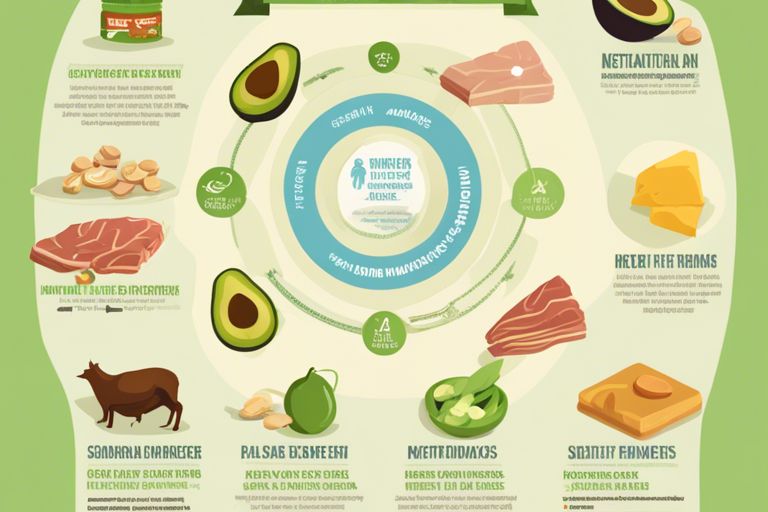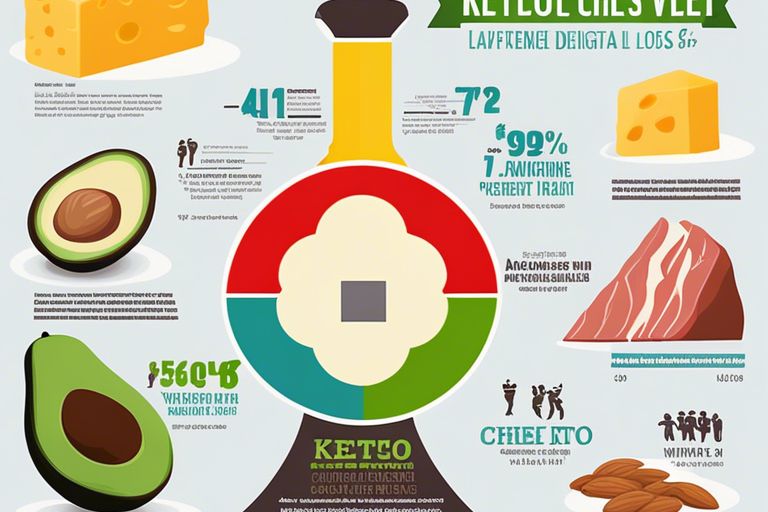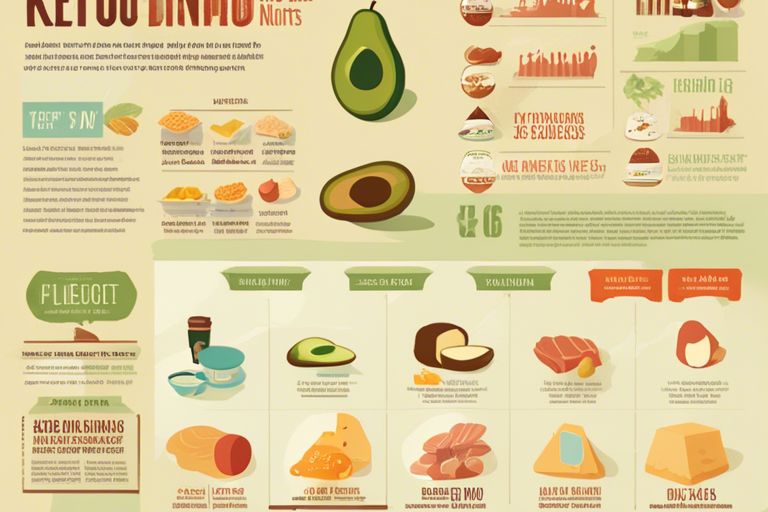Most revered for its rapid weight loss and improved focus and energy levels, the Ketogenic Diet is a highly debated topic in the realm of nutrition. This low-carb, high-fat diet has shown promising results for individuals seeking to shed excess pounds and regulate blood sugar levels. However, it is crucial to understand both the benefits and risks associated with this diet before initiateing on the journey to ketosis. Let’s explore into the science behind the Ketogenic Diet and explore its potential impact on our overall health.
Key Takeaways:
- Ketogenic Diet Benefits: The ketogenic diet can help with weight loss, improve blood sugar control, increase energy levels, and potentially reduce seizure activity in some individuals.
- Ketogenic Diet Risks: Some risks associated with the ketogenic diet include nutrient deficiencies, potential liver and kidney problems, and negative effects on cholesterol levels.
- Consult a Healthcare Professional: Before starting a ketogenic diet, it is important to consult with a healthcare professional to assess individual health conditions and ensure the diet is safe and appropriate.

The Mechanisms of Ketogenesis
If we are to truly understand the ketogenic diet, we must explore into the intricate mechanisms of ketogenesis. This process is the key to how the body produces ketones, which are crucial for fueling the body when carbohydrates are limited.
Biochemical Pathways to Ketone Production
Pathways within the body lead to the production of ketones. When carbohydrate intake is low, the liver breaks down fatty acids into ketone bodies through a process called beta-oxidation. These ketone bodies, such as acetoacetate and beta-hydroxybutyrate, can then be used by tissues for energy production.
Pathways also involve the ketogenic amino acids lysine and leucine, which can be converted into acetoacetate and acetyl-CoA, further contributing to ketone production. These biochemical processes are essential for maintaining energy balance during times of carbohydrate restriction.
The Role of Fasting and Dietary Manipulation
Pathways such as fasting and dietary manipulation play a crucial role in promoting ketogenesis. During fasting, the body depletes its glycogen stores and shifts to utilizing fats for energy, leading to increased ketone production. Similarly, following a low-carbohydrate, high-fat diet can mimic the effects of fasting and promote the production of ketones.
To understand the significance of these Pathways, it is vital to recognize that ketone bodies not only serve as an alternative fuel source but also have important signaling roles in regulating metabolism and gene expression. The ability to harness the power of ketogenesis through fasting and dietary manipulation offers a unique approach to optimizing health and well-being.
The Benefits of the Ketogenic Diet
Weight Loss and Metabolic Advantages
Advantages One of the most well-known benefits of the ketogenic diet is its effectiveness in weight loss and providing metabolic advantages. By drastically reducing carbohydrate intake and increasing healthy fats, the body shifts into a state of ketosis, where it burns fat for fuel instead of glucose. This metabolic state can lead to rapid and sustained weight loss for many individuals, especially those who have struggled to lose weight through other means.
Advantages In addition to weight loss, the ketogenic diet has been shown to have numerous other metabolic benefits. Studies have demonstrated improvements in insulin sensitivity, blood sugar control, and cholesterol levels in individuals following a ketogenic diet. These metabolic advantages not only support weight loss but also have a positive impact on overall health and well-being.
Therapeutic Potential for Neurological Disorders
Potential The ketogenic diet has shown great promise in the treatment of various neurological disorders, particularly epilepsy. Research has found that the high-fat, low-carbohydrate diet can help reduce the frequency and severity of seizures in individuals with epilepsy, including those who do not respond to traditional medications. This therapeutic potential has led to the adoption of the ketogenic diet as a viable treatment option for epilepsy patients.
Ketogenic Furthermore, ongoing research suggests that the ketogenic diet may have therapeutic benefits for other neurological conditions, such as Alzheimer’s disease and Parkinson’s disease. The potential neuroprotective effects of ketosis, including reduced inflammation and oxidative stress, offer hope for individuals suffering from these debilitating disorders. While more studies are needed to fully understand the extent of these benefits, the ketogenic diet continues to showcase its potential in the field of neurological health.
The Risks and Considerations
For those considering the ketogenic diet, it’s essential to be aware of the potential risks and considerations involved. While the diet can offer various benefits, it’s crucial to understand the possible drawbacks to make an informed decision about whether it’s the right choice for you.
Potential Short-term Side Effects
An individual starting the ketogenic diet may experience some short-term side effects as their body adapts to burning fat for fuel instead of carbohydrates. These can include keto flu symptoms such as headache, fatigue, dizziness, irritability, and constipation. These side effects are usually temporary and can be managed by staying hydrated, increasing electrolyte intake, and ensuring an adequate intake of micronutrients.
It’s important to note that not everyone will experience these side effects, and they typically subside as the body adjusts to using ketones for energy. However, it’s essential to listen to your body and consult with a healthcare provider if you experience severe or prolonged symptoms.
Long-term Health Implications
With any long-term dietary intervention, there are potential health implications to consider. While the ketogenic diet has shown promise in managing certain health conditions and promoting weight loss, there are concerns about its impact on long-term cardiovascular health. Some studies suggest that a high intake of saturated fats from sources like red meat and butter could increase the risk of heart disease and stroke.
Potential risks also include nutrient deficiencies due to the restrictive nature of the diet, particularly in essential vitamins and minerals like vitamin C, potassium, and magnesium. It’s important for individuals following the ketogenic diet to work with a healthcare provider or registered dietitian to ensure they are meeting their nutritional needs through food choices or supplements.

The Ketogenic Diet: A Scientific and Philosophical Analysis
Critically Assessing the Evidence for Efficacy
After delving into the realm of the ketogenic diet, it is imperative to critically examine the evidence supporting its efficacy. Many studies have shown significant weight loss and improvements in various health markers for individuals following a ketogenic diet. However, the long-term effects and sustainability of this diet remain subjects of intense debate.
On the one hand, proponents argue that the ketogenic diet’s ability to induce ketosis and reduce insulin levels could have profound health benefits, particularly for those with conditions like diabetes or epilepsy. Conversely, skeptics raise concerns about the restrictive nature of the diet and potential consequences on overall nutrient intake and gut microbiome diversity.
Ethical and Evolutionary Implications of Diet Manipulation
Ketogenic diets have sparked intriguing discussions surrounding the ethical and evolutionary implications of manipulating our dietary patterns. Restricting carbohydrate intake in favor of high-fat foods challenges conventional wisdom on nutrition and forces us to reconsider the ancestral diets our bodies have evolved to thrive on.
Evolutionary biology suggests that our hunter-gatherer ancestors primarily consumed a diet rich in plant foods with occasional animal protein, a stark contrast to the modern ketogenic approach. Ethical considerations arise as we question whether such drastic deviations from our evolutionary past are beneficial or detrimental to our health and well-being in the long run.
Summing up
Considering all points discussed throughout this article, it is evident that the ketogenic diet offers numerous benefits, including weight loss, improved mental clarity, and potential health benefits for certain medical conditions. However, it is crucial to acknowledge the risks associated with this diet, such as nutrient deficiencies, potential kidney issues, and difficulty in sustaining the diet long-term. Therefore, it is essential for individuals considering the ketogenic diet to consult with a healthcare professional before begining on this dietary journey to ensure that they can reap the benefits while minimizing potential risks.
FAQ
Q: What is the Ketogenic Diet?
A: The Ketogenic Diet is a high-fat, adequate-protein, and low-carbohydrate diet that forces the body to burn fats rather than carbohydrates, resulting in a state called ketosis.
Q: What are the benefits of the Ketogenic Diet?
A: The Ketogenic Diet has been shown to have several benefits, including weight loss, improved blood sugar control, increased mental focus and clarity, and potential anti-inflammatory effects.
Q: What are the risks associated with the Ketogenic Diet?
A: Some risks of the Ketogenic Diet include nutrient deficiencies, kidney stones, constipation, and an increase in LDL cholesterol levels. It is important to consult with a healthcare provider before starting this diet.

